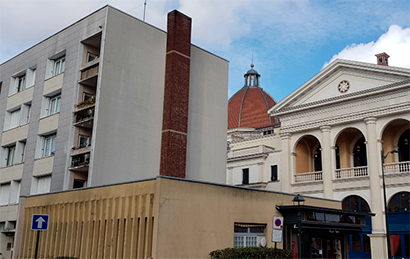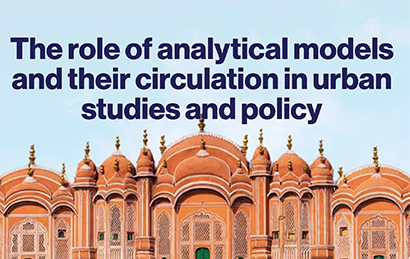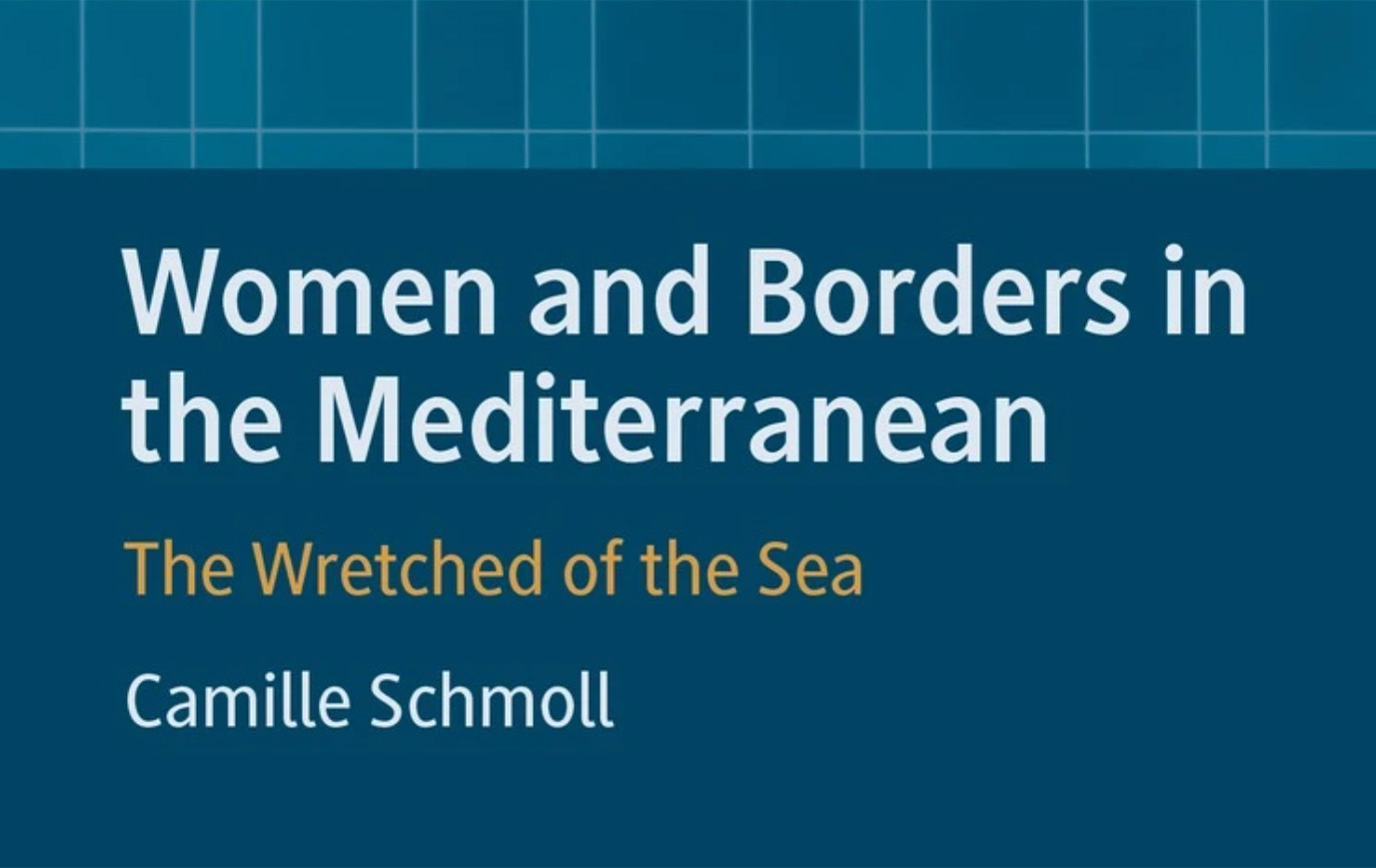PARIS Team
Thesis defense – Luc GUIBARD
The role of analytical models and their circulation in urban studies and policy
Daytime changes in urban segregation and neighbourhood composition according to people’s daily mobility
Women and Borders in the Mediterranean
Crowded and warmer: Unequal dengue risk at high spatial resolution across a megacity of India
Between security challenges and climate ambitions, the European Energy Union is asserting itself
Thesis defense – Élise THOURON
Eleonore Kofman, visiting professor
The emergence of artificial intelligence in engineering sciences for the territory

The PARIS team analyses territorial dynamics by considering that spatial and social interactions play a driving role in their composition and reconfiguration. The research is based on a diversified set of methods: spatial analysis, static and dynamic modelling, mixed qualitative and quantitative methods, and media corpus analysis.
Practices and representations of actors are increasingly being recognized. New data—web data, telephone data, and other digital traces—are mobilized to better understand spatial interactions. A fresh approach is being taken to the question of the articulation of spatial scales, from the neighbourhood to the metropolis, from the city to the world.
Temporal scales are also addressed, whether it be the slow dynamics of the evolution of city systems or the rapid dynamics at play in metropolitan spaces. Finally, spatial, social, and economic contexts are also the subject of specific research.
Originally French and European, the fields of study have been extended to the United States, Asia, and Africa, so that research is regularly put into perspective within a comparative framework.
Thematic
Research is organized around two main orientations. The first orientation concerns movements between cities, whether of people, urban knowledge, ideologies, or capital. The articulation between the individual level and the local and urban levels is key: local actors can accompany or resist certain processes, influence them or, conversely, drive change themselves. A second orientation focuses on transformations underway in small and medium-sized cities along with diffuse urban areas examining urban change in a decentralized manner in relation to the metropolitan focus.
From a theoretical point of view, we are building tools to analyse the city outside of a strictly hierarchical framework, by integrating horizontal and sometimes transnational relations. We are also interested in the intersections between research on cities of the South and the North. Several entries are investigated: socio-spatial inequalities and the way they are produced; the routine manufacture of the urban by inhabitants, by shopkeepers as well as by individuals caught up in large-scale mobilities; land, access to land and its conversion to urban uses, the growing role of finance and real estate development; digital tools as they transform urban practices and dynamics; the urban from the angle of the crisis, by questioning the social and political effects of the phenomena of degrowth and the impact of the economic crisis and the crisis of public finances.
From a methodological point of view, the focus is on the variety of data that can be mobilized, whether qualitative or quantitative, by integrating the non-conventional data now available to researchers (digital traces, collaborative platforms, etc.). Emphasis is placed on the dialogue between quantitative and qualitative methods as well as on international comparison.

Street Vendor ; New York City, USA, 2015
Three main types of complementary approaches are used. The first concerns spatial processes associated with globalization and their impact on city systems, in terms of emergence but also retraction and decline. Cities and networks are both vectors and markers of economic, commercial, and financial globalization. This approach can be successfully applied to either the North or South or adopting a comparative perspective.
A second approach, coined “multiplex,” focuses on exchanges between the work undertaken on both material networks (maritime, air, road transport, etc.) and immaterial networks (scientific collaborations, media, or financial flows). For example, it enables the analysis of spatial representations, feelings of belonging, and individual or collective discourses on space.
The third approach addresses the subject of territoriality and examines existing forms of territorial organization as well as those that are emerging, or attempting to emerge, outside of proven territorial frameworks in terms of the scale of territorial action. It is a question of taking a critical look at States, continents, or cultural areas as basic geographical and analytical units. The management of transnational regions is a real issue in many parts of the world; it requires examining territorial meshes and integration, territoriality, and multi-scalar governance.

Global network of scientific collaborations in 2013 (principal links by volume)
Data-visualization with the NETMAP prototype
Authors: Marion Maisonobe and Laurent Jégou
In continuation of the work long pursued within the PARIS team, a first research set concerns the further formalization of models. In the case of theoretical models, one of the challenges is to design models that reflect and reveal the dynamic and multiscale structures of the phenomena studied as well as the interactions between agents, structures, and processes. In the case of empirical models, an important challenge is to integrate and combine the complex structures of different databases. For both theoretical and empirical models, it is also important to discuss the historical contexts of development and use of the models.
A second orientation of this theme concerns the articulation of models and their complementarity insofar as each model sheds light on only one aspect of the phenomenon of interest. Examples include: the articulation of models centred on microscopic and macroscopic scales; the intersection of spatial (continuous) and territorial (discrete) approaches; the coupling of statistical models and multi-agent simulation models; the confrontation of models built on traditional data with those built (or to be built) on new and often massive data; the comparison of models developed in different fields of the social sciences.
Finally, the third orientation concerns the use that can be made of modelling and geovisualization tools to open and disseminate research avenues, to acquire new data, to encourage the involvement of a group of individuals in decision-making (participatory modelling), or to integrate decision-making processes.
For each of these orientations, the research conducted within this thematic axis concerns a broad spectrum of phenomena whose spatial structuring is examined: settlement systems, population mobility, material and immaterial flows, health inequalities, school space, conflicts, risks and vulnerability, etc.

Musical landscapes: a “mapping” of distances between musical genres based on the declared genres of the Deezer music catalogue. ANR RECORDS, 2020.
PARIS Team Members’ recent research initiatives
Sustainability of renewable energies
Dates: 2023 - 2025
The project aims at assessing the sustainability of electric renewable energy along the value chains, the concept of sustainability being understood in its social and environmental sense.
The territorial dimension of health crisis – DITES
Dates: 2022 - 2024
DITES project's objective is to reassess and propose methods of cooperation between the territorial levels in order to define modes of governance that would allow us to anticipate and adapt to different crises.
From the World Before to the World After – MAMA
Dates: 2021-2024
Contribution of Géographie-cités to the project "Du Monde d'Avant au Monde d'Après" (MAMA), a multidimensional survey on the adjustments, dynamics and reorganizations caused by the Covid pandemic19.














